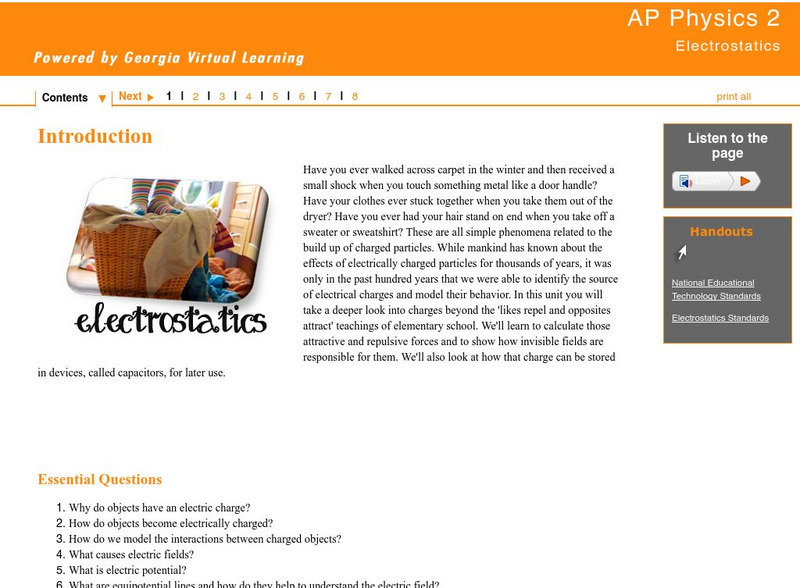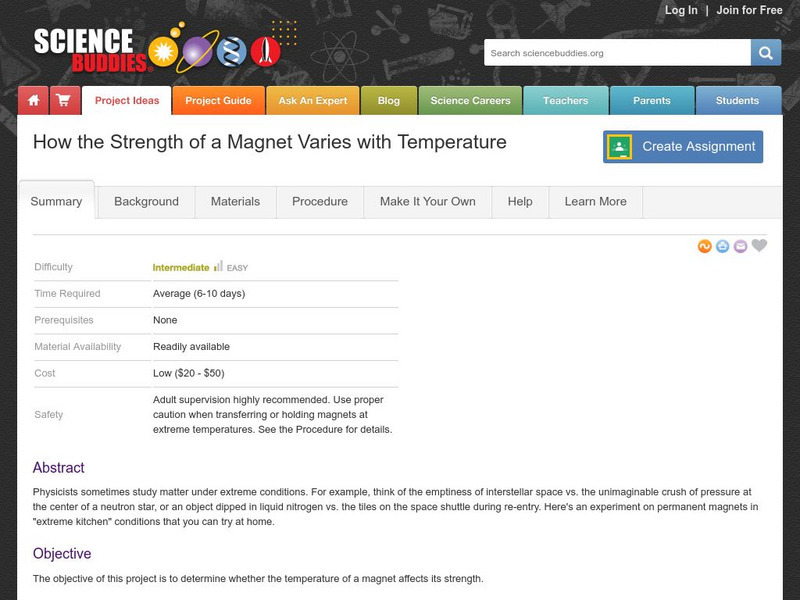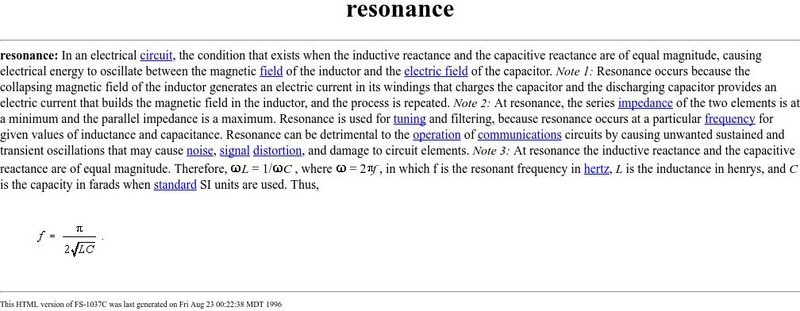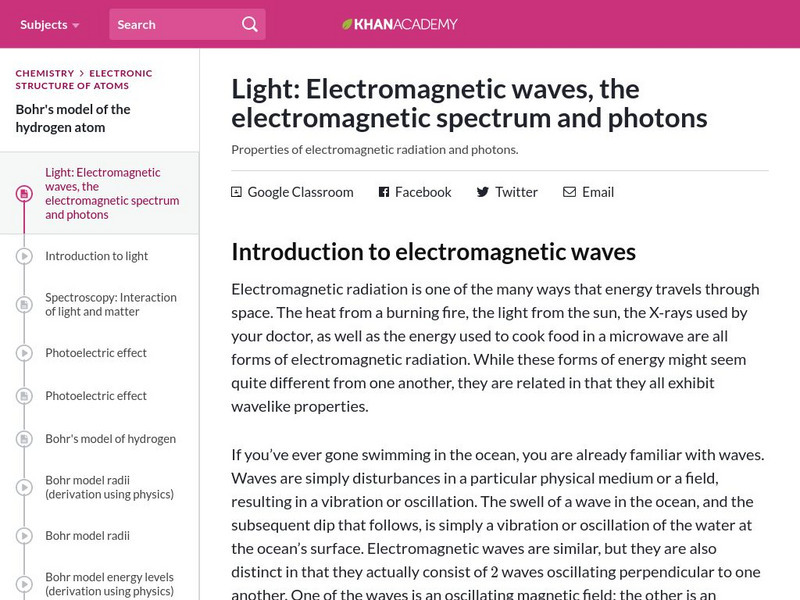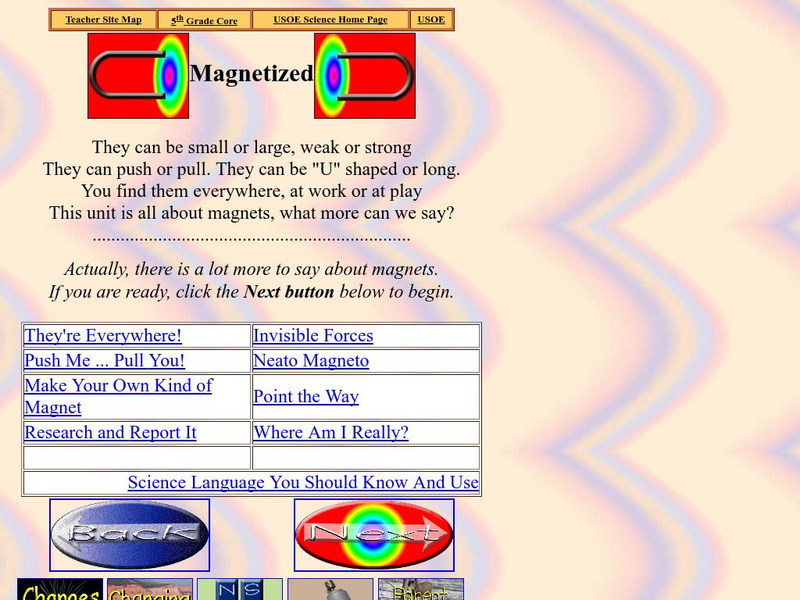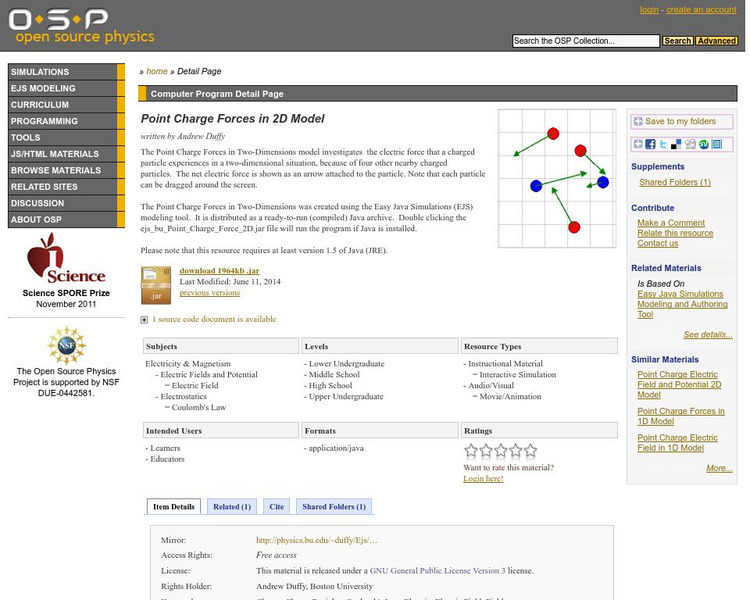Canada Science and Technology Museum
Canada Science and Technology Museum: Background Information for Electricity
The Canada Science and Technology Museum answers some of the most common questions about electricity. For example, get the definition of electricity, the difference between alternating and direct currents, and learn how a fuse works.
The Wonder of Science
The Wonder of Science: Ms Ps2 5: Electric, Magnetic, and Gravitational Fields
Work samples, phenomena, assessment templates, and videos that directly address standard: MS-PS2-5: electric, magnetic, and gravitational fields.
Georgia Department of Education
Ga Virtual Learning: Ap Physics 2: Electrostatics
In this unit students take a deeper look into charges beyond the simplified 'opposites attract." Students learn to calculate those attractive and repulsive forces and to show how invisible fields are responsible for them.
Science Museum, London
Science Museum: Pocket Motor
Teacher directed activity shows students how flowing electrical current produces a magnetic field by building a simple motor.
Wolfram Research
Wolfram Science World: Eric Weisstein's World of Science: Michael Faraday (1791 1867)
Brief information about Michael Faraday and his extensive accomplishments in the field of electricity.
Exploratorium
Exploratorium: Science Snacks: Motor Effect
"A magnet exerts a force on current-carrying wire." This simple device shows how magnets affect wires with current in them, the basis of the electric motor. If you see, feel and understand this, the electric motor becomes very clear.
Exploratorium
Exploratorium: Science Snacks: Magnetic Pendulums
See how electricity and magnetism interact with this activity. Activity has students creating a current by swinging a copper coil through a magnetic field. The copper coil will start a second coil swinging as well.
Exploratorium
Exploratorium: Science Snacks: Motor Effect
Create a simple device to see how a force is exerted on a current by a magnetic field. This activity shows how an electric motor can be made with this force.
Science Buddies
Science Buddies: How the Strength of a Magnet Varies With Temperature
Physicists sometimes study matter under extreme conditions. For example, think of the emptiness of interstellar space vs. the unimaginable crush of pressure at the center of a neutron star, or an object dipped in liquid nitrogen vs. the...
Georgia Department of Education
Ga Virtual Learning: Currents, Resistors, and Power
In this interactive tutorial students will learn about electric current, resistance and current density. Learn how current density relates to electric field strength and how resistance produces heat.
Orpheus Books
Q Files: Electricity and Magnetism: Electric Charge
Learn how electric charges work and about Coulomb's Law, which is used to calculate the strength of an electric force.
Khan Academy
Khan Academy: Experiment: What's the Shape of a Magnetic Field?
See drawing from Hans Christian Orsted's lab notebook showing an experiment in which an electric charge passing through a wire seemed to create a magnetic field!
Science Struck
Science Struck: The Relationship Between Magnetism and Electricity
Provides a short explanation of the similarities between magnetism and electricity, the properties of their fields, and the effect they each have on a charged particle.
American Association of Physics Teachers
Com Padre Digital Library: Open Source Physics: Electric Generator Model
An electromagnetic induction model that simulates an electric generator made from a conducting loop rotating in a uniform magnetic field and connected to an ammeter.
CK-12 Foundation
Ck 12: Physical Science: Magnets
A module that uses pictures, videos, reading passages, and review question to go over what a magnet and magnetic pole are, and how magnetic force is related to magnetic field. This site may require free registration to access all...
Wolfram Research
Wolfram Science World: Maxwell, James
This ScienceWorld site describes the Scottish mathematician and physicist James Maxwell (1831-1879) who published physical and mathematical theories of the electromagnetic field.
Other
Institute for Telecommunication Sciences: Resonance
This site contains a straightforward definition of resonance in an electrical circuit.
Concord Consortium
Concord Consortium: Stem Resources: Electrons in Atoms and Molecules
A module with animations, explanations, and questions about the importance of electrons in the structure of an atom. Understand the definition and locations of electrons in the atom. Explore the role of electrons in bonding, polarity,...
Georgia Department of Education
Ga Virtual Learning: Electrostatics With Conductors
In this interactive tutorial students will find out why the electric field inside a conductor is zero. They can learn to read maps of equipotential surfaces surrounding charged conductors and map electric field lines from those...
Khan Academy
Khan Academy: Electromagnetic Waves: The Electromagnetic Spectrum and Photons
An article that discusses the coupling of an electric field with a magnetic field to create electromagnetic waves. Article also discusses how different types of electromagnetic waves have different wavelengths which forms the...
Georgia Department of Education
Ga Virtual Learning: Capacitance and Dielectrics
In this interactive tutorial students will be introduced to capacitance and the electric fields inside a capacitor. Learn what factors affect capacitance. Also learn about dielectric and how it affects capacitance.
Utah State Office of Education
Utah Science: Magnetized
A unit all about magnets! Explore magnetic forces, types of magnets, and more through these informative activities.
American Association of Physics Teachers
Com Padre Digital Library: Open Source Physics: Point Charge Forces in 1 D Model
Virtual simulation investigating the electric force that one charged particle exerts on another. Plot a graph of the electric force as a function of position.
American Association of Physics Teachers
Com Padre Digital Library: Open Source Physics: Point Charge Forces in 2 D Model
In this simulation, examine the electric force that a charged particle gains from nearby charged particles in a two-dimensional state. See the net electric force shown as an arrow attached to the particle.


